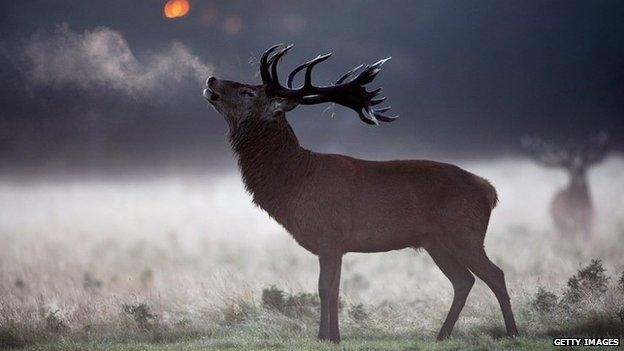Motorists warned of deer collisions as clocks go back
- Published

About 65 people are injured in collisions with deer every year
Scottish Natural Heritage (SNH) has warned motorists that collisions with deer peak at this time of year.
As the clocks turn back on 25 October, earlier nights will coincide with deer coming out to feed on roadsides.
From then until 16 November, warning messages will be displayed on electronic road signs.
The latest figures show there are over 7,000 collisions between motorists and deer in Scotland each year, with about 65 of these resulting in human injury.
SNH deer management officer Sinclair Coghill said: "From October to December, there is a higher risk of deer on the road as they move down to lower lying ground for forage and shelter, with the highest risk from sunset to midnight and shortly before and after sunrise.
"We advise motorists to slow down and watch for deer crossing roads.
"If you do hit a deer, report it to the police, as it may be fatally injured and suffering."
The annual cost of these collisions, through human injuries and damage to vehicles, is 拢7m.
Motorists are urged to drive within the speed limit to give a better chance of stopping.
SNH tips for drivers
Try not to suddenly swerve to avoid hitting a deer. A collision into oncoming traffic could be even worse.
Only break sharply and stop if there is no danger of being hit by following or oncoming traffic. Try to come to a stop as far away from the animals as possible to allow them to leave the roadside without panic, and use your hazard warning lights.
Be aware that more deer may cross after the one or two you first see, as deer often travel in groups.
After dark, use full-beams when there is no oncoming traffic, as this will illuminate the eyes of deer on or near a roadway and give you more time to react. But dim your headlights when you see a deer so you don't startle it.
Report any deer-vehicle collisions to the police, who will contact the local person who can best help with an injured deer at the roadside. Do not approach an injured deer yourself - it may be dangerous.
SNH is working with Transport Scotland and traffic Scotland to have warning signs across the West and Northwest of Scotland.
Researcher for the Deer Vehicle Collisions Project Dr Jochen Langbein said: "Many people think most accidents with deer and vehicles occur on more remote Highland roads, but in Scotland up to 70% occur on A-class trunk roads or motorways.
"As well, when traffic volume is taken into consideration, the risk of a collision with a deer is about twice as high per vehicle-mile driven in Scotland compared to England."
The warning messages will be displayed on the A9, A87, A82, A85 and the A835.
- Published27 June 2015
- Published17 October 2011
- Published3 February 2014